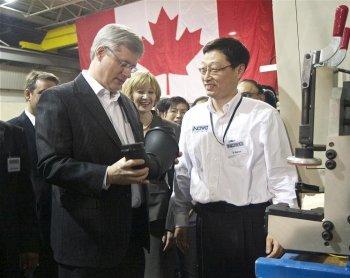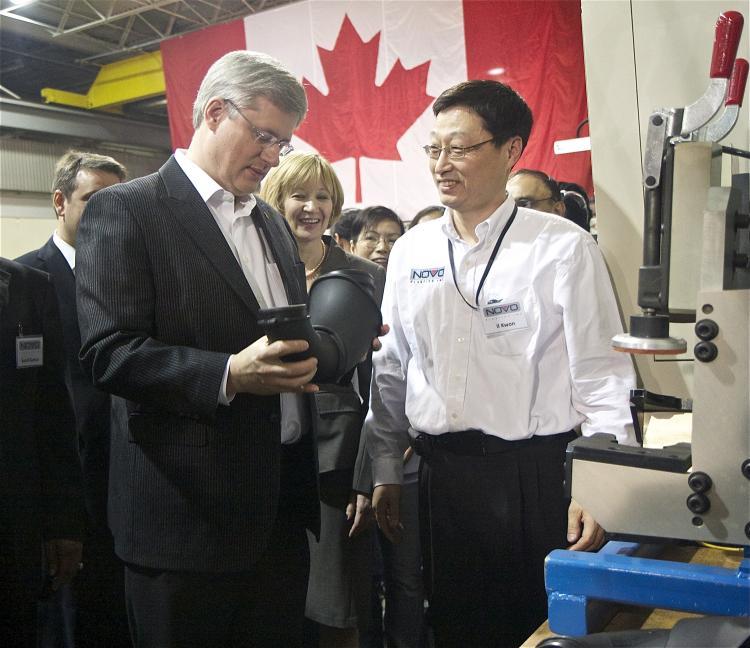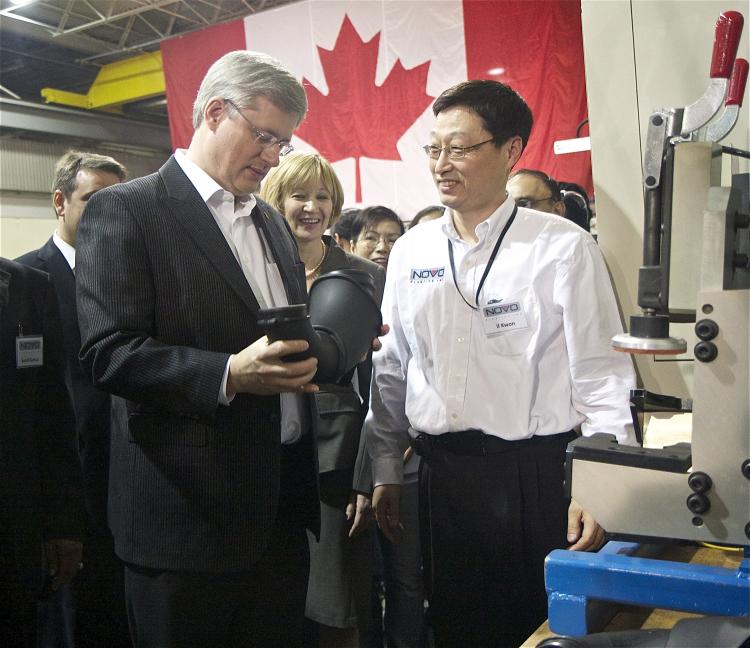TORONTO—Photographers crushed around the yellow machine as Il Kwon, an engineer educated in Korea and again in Canada, waited for his closeup with Conservative leader Stephen Harper.
“Is this our photo op?” someone shouted in an incredulous tone as each photographer and video camera operator tried to squeeze around heads and elbows to get an angle on the “leak tester” Harper would be operating.
Kwon said later he was nervous something would go wrong, not because it was the man people call prime minister who would be pushing the buttons that day, but because he is always a little nervous whenever a newbie steps up to the machine.
“But he did very well, there is no accident. Everything is fine. My first issue is safety,” said Kwon later.
Harper shook hands as he made his way to the tester at Novo Plastics in Markham, a suburb of Toronto. After a brief lesson from Kwon, he took the controls. The tester pumps a car tire’s worth of air pressure into plastic auto parts to test their ultrasonic welded seams. On that day it was a resonator prototype for the exhaust system of a Ford Falcon sold in Australia.
Harper wasn’t afraid of the machine, said Kwon, and after learning the simple operation didn’t hesitate to carry out the test.
“I was happy he finished the whole process, so I think he is a very good man to do this job, probably he can do another job too,” he said.
But whether that job is being prime minister of Canada, Kwon isn’t sure yet. He said he remains undecided, and wants to compare each party’s platform before deciding his vote.
“I think he is doing very well, but we still have time to check,” he said.
Undecided Immigrant Voters
Kwon is the epitome of why Harper was at Novo Plastics that day—he is the undecided professional immigrant. His degree in mechanical design from Korea meant little in Canada so he went back to school here for a diploma in mechanical engineering from George Brown College in Toronto.
It’s an experience familiar to new Canadians who leave behind jobs as doctors and lawyers in their home countries to become what incumbent immigration minister Jason Kenney once called the “best-educated taxi drivers in the world.”
Fixing the credential recognition problem has been a priority for the Conservative government, but it has proven difficult to solve because of the maze of requirements for different provinces, professional associations, and degree programs in various countries.
Harper told the crowd in Markham, Ontario, that a re-elected Conservative government would fund a new student loan program to help immigrant Canadians get their foreign credentials recognized in Canada.
“None of us as Conservatives wanted this campaign,” Harper bemoaned.
“These were the kind of things your member of Parliament was working on in Ottawa before this unnecessary election was called,” he said as Markham Conservative incumbent Paul Calandra looked on beside him.
Kwon wasn’t sure how well it would work. After all, he said, a loan still has to be repaid.
The plan has no details and looks to be the fulfillment of a vague promise in the budget the Tories tabled before Parliament was dissolved over a Liberal non-confidence motion.
That promise was that the government would test ways to help foreign-trained workers cover the costs of tuition and training to get their foreign credentials recognized. A more specific measure in the budget promised that the costs of certificate examinations would also be eligible for the Tuition Tax Credit.
Target Voters, General Message
It’s these kinds of promises the Conservatives hope will appeal to specific voters seen as key to scoring the majority Harper is seeking.
In the budget that has become the blueprint for the Tory campaign, the Conservatives promised a $600 top-up to the Guaranteed Income Supplement for seniors, a $2,000 tax credit for caregivers with ill family members, and loan forgiveness for doctors and nurses who work in under-served rural areas.
These measures and others promised during the campaign target key electorates attractive to all parties: immigrants, seniors, rural voters, and the middle class.
The Liberals, who launched their own platform this week, have their own initiatives targeting those voters, some very similar to the Conservatives.
Besides variations for those specific audiences, Harper’s broader campaign message has also become clear: The election is unnecessary, it is taking place when the global economy is fragile, and a coalition led by the Liberals will take control of Parliament if the blue team doesn’t score a majority.
“People are fed up with minority after minority, election after election,” Harper said that morning in Markham.
While the Tories were hesitant to even mouth the word “majority” in previous elections, now there are only two choices on the table, says Harper—a stable Tory majority or a Liberal-led coalition.
It plays into Harper’s hand that Liberal leader Michael Ignatieff hasn’t ruled out pulling the rug out from under a Tory minority. While Ignatieff vowed in a recent statement that should he win a minority he would not form a coalition, he said nothing similar about what he would do should the Conservatives win a minority.







